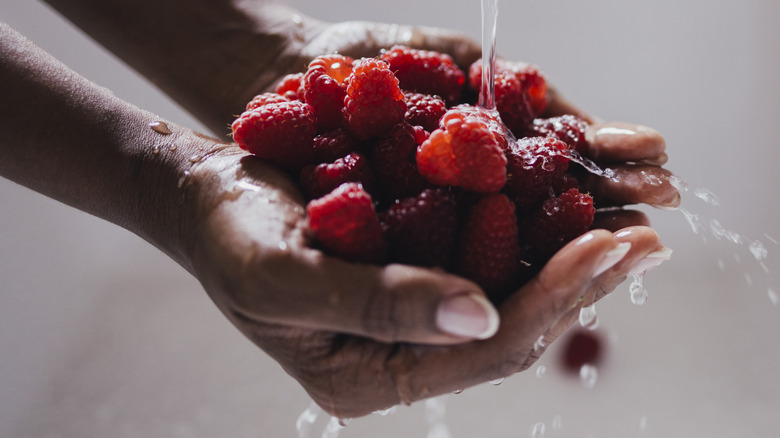Your Risk Of Early Death Goes Up If You Stop Eating This Type Of Fruit
Thinking about death sounds rather morbid, but if you're health- conscious, you probably look for ways to live longer. Many factors mix to determine your longevity, some of which you can't control (such as your age, sex, genetics, and family history). Your environment also plays into how long you live, including where you live, your social connections, and your stress levels. Your disease susceptibility can depend on how these factors interact.
Other risk factors are those under your control, according to the National Institutes of Health. Smoking and obesity each account for around 12% of early deaths, and high blood pressure also takes years off your life. The primary factor increasing the likelihood of an early death is an unhealthy diet. It's not that a poor diet directly causes death; rather, the 14% elevated risk of premature mortality points to conditions like heart disease or cancer. An unhealthy diet typically involves consuming processed meats and high-sodium foods while lacking sufficient intake of vegetables, fruits, nuts, and seeds. In particular, eliminating berries from your diet could mean you'll be missing out on key antioxidants that can help you fight diseases linked to early death.
Berries can reduce your risk of early death
Eating a bowl of berries every day might be key to lowering your risk of early death. A 2024 article in the Journal of Nutrition looked at the diets of more than 37,000 people over 8 years. People who regularly consumed any type of berry had a 21% lower risk of early death than people who didn't eat berries. If you love cranberries, you could reduce your risk of death by 31%. Blueberries aren't far behind with a 21% lower risk, and strawberries offer a 14% reduced risk of early death. Per the researchers, the flavonoids in berries protect people from early death from cardiovascular and respiratory disease.
Because cardiovascular disease is a common cause of death, a 2016 meta-analysis in Scientific Reports investigated how berries might reduce some of the factors that lead to cardiovascular disease. Eating more berries can lower your LDL cholesterol, systolic blood pressure, fasting glucose, Hemoglobin A1c (HbA1c), inflammation, and body mass index (BMI).
Berries and a healthy life
The bioactive compounds in berries can help you live not only a longer life but also a healthier one, according to a 2015 article in the International Journal of Molecular Sciences. The ellagic acid and quercetin in strawberries can protect against oral, colon, and prostate cancer. The polyphenols in red raspberry extracts may also prevent cancer cells from growing. Red raspberries might also be a good choice to control the early stages of diabetes and hypertension.
If you want to protect your brain, you can turn to blackberries. The metabolites in blackberries defend your brain cells against oxidative stress that can lead to neurodegeneration. Meanwhile, blueberries help the circulation in your eyes while also defending your eyes from the free radicals that can lead to cataracts and macular degeneration. Blueberries also protect your pancreas from oxidative stress caused by glucose, which can help manage diabetes; they might also safeguard your DNA from damage. Lastly, you can turn to the strong antioxidant power of cranberries to ease urinary infections because they prevent E. coli bacteria from affecting the cells in your urinary tract. As an added bonus, the phenolics in cranberries also have anti-cancer potential.



